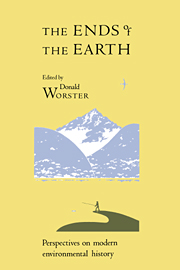1 - The Vulnerable Earth: Toward a Planetary History
Published online by Cambridge University Press: 05 June 2012
Summary
It is man's earth now. One wonders what obligations may accompany this infinite possession.
–Fairfield Osborn, Our Plundered Planet (1948)In the early days of October 1492, great flocks of birds, migrating southward along the eastern flyway of North America, following an ancient course over open water far from sight of land, fly over three small Spanish caravels. The ships' crews and their captain, Christopher Columbus, have come from Europe across more than two thousand miles of open ocean. They have no idea of how many more miles they have yet to go to reach land, and many of them are tired and fearful. So far they have been following abstract theory, not instinct. But now, abandoning all their logical calculations, the men follow in the wake of the birds. They are on a direct line to the nearest landfall. On 12 October a lookout discerns a whitish cliff in the moonlight and sings out, “Tierra, tierra!” By noon of that day Captain Columbus is ashore on a tiny green island in the Bahamas, bearing the cross of Christendom and kneeling in joy and relief that his voyage has been a success. He is nowhere near his goal, Japan and the Indies, he will soon realize. Instead, with the help of the migrating birds he has arrived at a new and altogether unsuspected world.
If modern history has a single, fabled point of beginning, it is here with Columbus's finding of the Americas. They had not been lost, they simply had not existed heretofore in the European mind.
- Type
- Chapter
- Information
- The Ends of the EarthPerspectives on Modern Environmental History, pp. 3 - 20Publisher: Cambridge University PressPrint publication year: 1989
- 1
- Cited by



